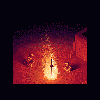Game Engine: Godot Game Engine
Language: GDScript — Syntax very similar to Python
My questions are obviously within these bounds. I am very happy with Godot as an engine; and I do not think that my limitation to GDScript prevents me from any of what I aim to achieve: many have done so before me. It is almost entirely a matter of logic and the implementation of that logic within the bounds of resources available. With that said, let me propose my problem.
I am by no means an adept and fluent programmer, but my knowledge has been sufficient enough to make games in the past and I feel that I am capable of implementing whatever structures, systems and logic trees are suggested to me with some thought and exercise.
I have created a dialog system in Godot Game Engine which I am (somewhat) happy with, but does not achieve my core goal. Keep in mind this system was completely created by me and I was not following any examples, which could contribute to why it is so awful.
The first thing to note is that this system only allows any sign or enemy to have two states of text: An intro, and if specified, a continuation of that text. An exported variable lets me check a boolean to say "This character has two lines of dialog." — Upon speaking to the character they might say "Hello [player], my name is [entity], nice to meet you!" Then be flagged to say that the character has spoken to them.
Upon "activating" them the second time, the script will see that it HAS a second line of text, and then the NPC might say "It's a nice day today!"
The main core of this is done through three systems:
- Checking if the player is next to an interactive object.
- Passing the character details to a function which will query an external config file for appropriate dialog.
- Displaying the text on screen. (This part is fine, I'm totally happy with how it turned out)
Let's say that I have a Skeleton that the player can talk to. Its external parameters are this:
SECTION: GRAVEYARD (Its location)
KEY: SKELETON (Its identifier)
EXTENDED: True (Does this NPC have two lines of text?)
The script would then query a .cfg file which contains a dictionary of text; it would look like the following.
[GRAVEYARD]
SKELETON = {"INTRO": " Why don't skeletons fight each other?.","IDLE": "BECAUSE THEY DON'T HAVE THE GUTS!."}
The first time the player talks to him, the script would see that it has two lines of text. It would automatically search for "SKELETON" in "GRAVEYARD" in the config file. (See above.)
The script would then retrieve the dictionary value held in "INTRO" and flag the NPC such that the next time the script is called it searches for the "IDLE" dictionary value.
The player then activates it again, the script sees the flag, and then looks for "IDLE" instead of "INTRO".
This is the best that I could do. And it's god awful. It serves no purpose, other than to display two different mundane pieces of text.
So why don't I use the system to enable more?
This is where my logic runs out. Bam. None.
The way that Godot (and MANY other engines, including Unity) handle objects are through nodes. These are the equivalent to Unity prefabs. I create an object and I have the luxury of attaching a script to it, which defines the way that ALL of those objects will behave, which saves me a lot of coding. Obviously there is a ridiculously easy solution to this, but my experience doesn't allow me to think of one, which is why I am here.
If the script searches for an invalid dictionary, the whole game crashes. If it searched for "IDEL" instead of "IDLE" — it's game over. (No pun intended.) So a solution would be to create a different script for each NPC in the entire game, but this doesn't work. What I need is a dialog tree which can be safely called by all NPC's in the game to get different text based on the situation. Is the player low on health? The NPC could say "You look sick!", is the player on a quest? The NPC could say "I hope you've killed those pesky Goblins!", has the player just saved someone's life? They could say "Wow, thanks for saving me!"
I will probably never use such complicated trees, and my current system could pass for this game as it's only a Castlevania-esque platformer. But it does me no favours, and while it has taught me a lot, is a huge bottleneck not only for creating dialog, but for my event system (flipping switches, opening doors with keys etc.) which works very similar to the above.
I have researched dialog trees, but they're all in the context of LUA/C++ which I obviously can't use. I'm pretty sure Godot supports XML but I don't think it can read XML files in the usual way — in that XML is specifically just a format for saving scripts or prefabs. I have a Config File system which can store any kind of variable or dictionary, and a surprisingly powerful scripting language that can do just about anything that Python can do.
I guess the best way to describe my limitation from my point of view is that I don't know how to create a system where entities or interactive objects behave differently while still using the same script. Obviously, there are other factors, and dozens of ways around it, but I really really really need a push in the right direction. Please give me some logic advice, or ways that you tackled similar issues. Thank you so much for taking the time to read this.




